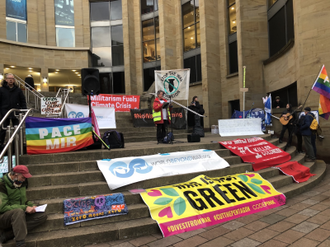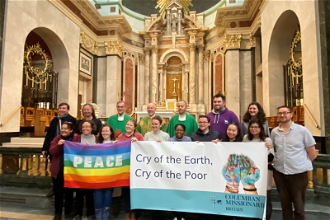COP26 Blog 6: 'War causes Climate Change and Climate Change causes War'

Peace gathering at Buchanan Steps
Energy was the theme for today at COP26. And the day started with the announcement that 20 governments have promised to stop financing oil, coal and gas projects beyond their borders, with 40 countries pledging to phase out coal power, the world's most polluting fossil fuel. But a smaller meeting, outside of the main conference caught my eye.
I've been here in Glasgow covering the UN Climate Summit for five days now and not heard anything at the gathering of nations about military expenditure and military greenhouse gas emissions. Militaries and the industries that support them are among the world's largest polluters but are often exempt from having to report and reduce their emissions which are causing global warming.
However, an alliance of peace groups - including the Movement for the Abolition of War (MAW), Pax Christi and Christian CND - held a public meeting this afternoon at the Buchanan Steps in Central Glasgow pushing for military pollution to feature in climate agreements. The message of the meeting to COP26 was: 'War causes Climate Change and Climate Change causes War.'
They would like to see less focus on militarising responses to climate impacts, such as corralling climate refugees, and more on tackling the causes of climate change linked to militaries. Speaker Dr Stuart Parkinson of Scientists for Global Responsibility asked: Does the UK government really prioritise tackling the climate crisis? If so, why does it spend over seven times more on its military than on its Net-Zero Strategy?
The meeting highlighted that modern militaries are completely dependent on fossil fuels with no sign of realistic or practical Net-Zero plans. A fundamental question is: how should 'defence' look in a post-carbon, climate changed world? As the richer nations, themselves responsible for the historic burden of greenhouse gas emissions, struggle to raise $100bn annual climate finance for poorer nations, it is worth noting that just one year of global military spending ($2 trillion) would deliver 20 years of international climate finance.
Militaries are major greenhouse gas emitters and typically the largest energy consumers among any government agency. Because militaries have been excluded from compulsory reporting obligations since Kyoto, data on global military emissions is very limited. In spite of the scale of their emissions, the military's contribution to climate change impacts is not part of official COP26 discussions in November 2021. The meeting in Glasgow heard that a letter and petition has been sent to COP26 calling for military greenhouse gas emissions to be on the agenda for COP27 next year. Pax Christi England and Wales, Anglican Pacifist Fellowship, MAW, Peace Pledge Union and Scientists for Global Responsibility were amongst more than 100 groups which had signed.
The flier of today's event carried a photo of Catholic peace campaigner Bruce Kent outside parliament more than a decade ago with a banner reading 'Climate Change causes War and War causes Climate Change.' His prophetic stance has increasingly been picked up by the mainstream Churches and civil society.
When the Columban Missionaries launched their Climate Policy statement last week, they said: "Increasingly communities are in conflict as a result of Climate Change which is a growing threat to global security……. Faced with the climate crisis, and global military expenditure rising to almost US $2 trillion in 2020, there is a critical need for the military to be included in commitments by states to reduce their greenhouse gas emissions."
Since this summit is identifying key polluters, it is disappointing not to hear any mention so far of the world's militaries and climate change.
LINKS
DVD Conflict and Climate Change - www.kevinmayhew.com/products/conflict-and-climate-change-1501412
Scottish CND's Toolkit for COP26 includes a programme of Climate and Peace events and actions, links to petitions and open letters, and resources. www.banthebomb.org/cop26-toolkit/


















